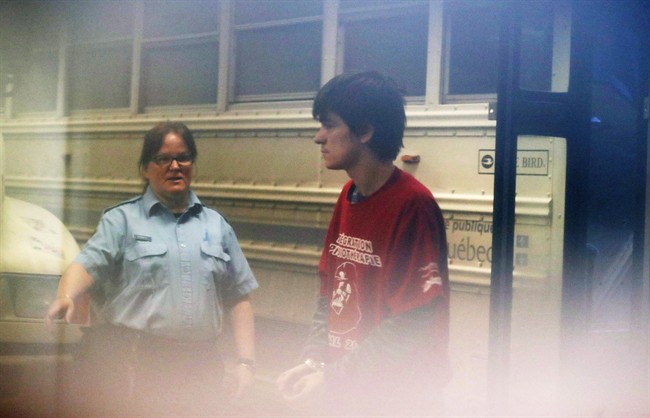The Quebec City mosque shooter considered shooting up the largest shopping centre in the city two months before the opening fire on Muslim worshippers, according to testimony by a forensic psychologist called to testify by the defence during sentencing arguments for Alexandre Bissonnette.

Bissonnette pleaded guilty to six counts of first-degree murder and another six counts of attempted murder for the shooting that happened after evening prayers on Jan. 29, 2017.
READ MORE: Former teacher of Quebec mosque shooter describes how he was bullied
Marc-André Lamontagne testified that Bissonnette told him he had the impression that he “had been trapped” by a demon.
On Nov. 26, 2016, Bissonnette had been on a two-week medical leave from his job at Hema-Quebec, where he worked part-time since the summer of 2014 and had been thinking of committing suicide for those two weeks.
Bissonnette told Lamontagne that on that day, he went to his parents’ house and drank two glasses of wine. Then, he took his two handguns and five chargers, containing 10 bullets each and drove to the underground parking lot at Place Laurier. He loaded one of the handguns and then drank alcohol that he hid in his vehicle.
He contemplated shooting himself in his car or going into the shopping centre and shooting at people. He said he wasn’t able to do either and ended up going to a nearby Starbucks with his guns in his backpack where he worked on his laptop for a while before going back home.
READ MORE: Alexandre Bissonnette ‘regrets’ not shooting more people in Quebec mosque attack
Lamontagne told the court Bissonnette was the victim of bullying that began in Grade 5, a fact confirmed by the defence’s first witness, a former high school teacher, who said she regrets not intervening more in the bullying she says Bissonnette endured almost daily that was sometimes physical.
Bissonnette even repeated one year of high school in order to no longer be in the same class as his harassers but continued to be bullied by students in his new class.
Bissonnette told Lamontagne that at 16, he started thinking about suicide and thought about burning down the school as an act of vengeance, but that these thoughts just made him more suicidal.
Throughout his teen and adult years, Bissonnette consulted several doctors and psychologists. He was prescribed anti-depressants, such as Luvox and Paxil. Bissonnette began taking Paxil at the beginning of January 2017. He told Lamontagne that he doubled, even tripled his dose and also consumed alcohol.
READ MORE: Judge sentences New Zealand man who called for retaliation for Quebec mosque shooting
At 18, he began to make a few friends and started to drink alcohol when going out with them. Lamontagne testified that Bissonnette had three one-night stands in his early 20s, but no long-term relationships.
He said Bissonnette told him that he wasn’t able to approach women when he wasn’t drunk. He also used alcohol to manage his anxiety. In 2013, he started drinking alone as well as before work. By 2016, Bissonnette was drinking six times a week, at least eight drinks in one sitting and hiding alcohol in his car and parents’ home.
In August 2014, Bissonnette planned to hang himself in his parents’ shed one day when they were at the family cabin but changed his mind when his fraternal twin brother decided to stay home. Two months later, he received his restricted firearms licence after lying on his application that he did not have psychiatric problems in his past, nor suicidal thoughts.
It was around this time that he became interested in mass shootings and the shooters responsible, feeling an affinity for those of them who’d also been bullied or mistreated in their childhoods.
In his report prepared for the defense, Lamontagne writes, “He said that he had become ambivalent about his own plan for killing in the fall of 2015. He mentioned that he attempted to commit suicide several times with his handgun, but that he was never able to make the decision to shoot.”
READ MORE: Gunman says he went to Quebec mosque in 2017 to protect people from terrorists
After the June 12, 2016 shooting at the Pulse nightclub in Orlando, Lamontagne said that Bissonnette decided that if he was going to commit a mass shooting, it would be better to kill “terrorists” instead of “just anyone.”
“I had to do something big before committing suicide even if there was a part of me that didn’t want to … I had to do something with my life,” Lamontagne said Bissonnette told him.
“There was something great about that (shootings). It’s as if at least in the last minutes of my life, I was going to be like God,” Bissonnette continued.
Bissonnette told the psychologist that he believed that there was at least one “dangerous fanatic” in the Quebec City Islamic Cultural Centre, which would justify his taking innocent lives.




Comments